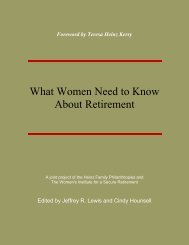What Women Need to Know About Retirement - Wiser
What Women Need to Know About Retirement - Wiser
What Women Need to Know About Retirement - Wiser
You also want an ePaper? Increase the reach of your titles
YUMPU automatically turns print PDFs into web optimized ePapers that Google loves.
Chapter Four: Six Things You <strong>Need</strong> <strong>to</strong> <strong>Know</strong> about Social<br />
Security<br />
By Jo Anne B. Barnhart<br />
strategyz13@yahoo.com<br />
Most workers—about 96 percent of us these days—pay in<strong>to</strong> the Social Security system through<br />
federal payroll or self-employment taxes. In return, we receive an income benefit when we<br />
retire. Social Security benefits rise with the cost of living, so inflation doesn’t shrink their value.<br />
Once you begin receiving retirement benefits, you will get them as long as you live, even if (and<br />
here’s hoping) you’re still around at age 110. (Social Security is also a disability program and a<br />
family support program if the breadwinner dies or becomes disabled. But in this chapter we’ll<br />
only be discussing the role it plays in providing retirement income benefits for older Americans.)<br />
After reading this chapter, you’ll know:<br />
1. How you earn benefits<br />
2. The types of benefits available<br />
3. When they’re available<br />
4. How much you qualify for<br />
5. How taxes affect your benefit<br />
6. How <strong>to</strong> apply for your benefits<br />
Why is it important for you <strong>to</strong> know these six things? Because Social Security is the first line of<br />
defense against poverty for millions of women. Without Social Security, more than half of the<br />
older women alive <strong>to</strong>day would be poor. These women are our grandmothers and mothers, our<br />
aunts, and our neighbors. And eventually, we could be those women. Consider knowing these<br />
six things about Social Security as your line of defense against poverty in retirement.<br />
#1: How You Earn Benefits<br />
You are eligible for a Social Security retirement benefit once you have earned 40 credits, which<br />
for most people is after they have worked and contributed <strong>to</strong> the system for 10 years. Ultimately,<br />
your benefit is based on your earnings over 40 work years. For each year you don’t work in that<br />
40-year period, a zero is entered in<strong>to</strong> the calculation. The lowest five years of your earnings are<br />
dropped, and retirement benefit amounts are based on your income averaged over 35 years.<br />
Since Social Security first arrived on the scene (more than 70 years ago) millions of women have<br />
not qualified for their own benefit as retired workers because they didn’t work enough years.<br />
For women who have qualified, their benefits have been low due <strong>to</strong> the number of years they<br />
spent out of the workforce (for example, raising a family or taking care of parents or in-laws) and<br />
because women generally earn lower wages. In these cases, Social Security has provided a<br />
“spousal benefit” <strong>to</strong> married and certain divorced women based on their husbands’ work<br />
his<strong>to</strong>ries. The next section covers spousal benefits in detail.<br />
31




